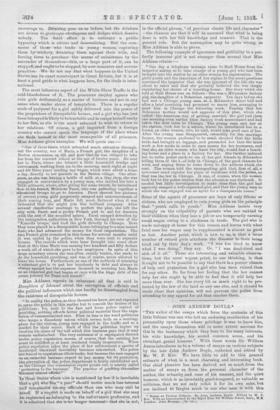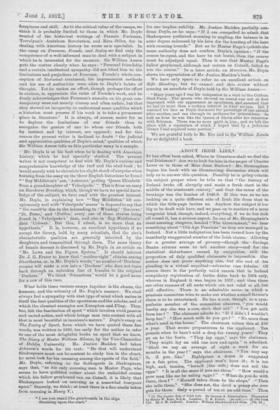- JOHN ANDREW DOYLE.* "THE writer of the essays which
form the contents of this little Volume was one who left an enduring recollection of his personality upon those whose privilege it was to know him, and the essays themselves will to some extent account for this in the testimony which they bear to his many interests, his wide knowledge, his sound common sense, and his abundant• genial humour." With these words Sir William Anson introduces us to a volume of essays on various subjects by the late john :Andrew Doyle, collected and edited by Mr. W. P. Ker. We have little to add to this general estimate of what is a moat charming and interesting book. Our chief pleasure has been derived not so much from the matter of essays as from time personal character of the author, the urbanity, and ease of his manner, and the quiet humour, which is EYo invariably_ good,terupered, so valuable as criticism, that we . not only relish it for its own sake, but are inclined to forgive much in one who uses it with this • Essays en Various Subjects. By ,John Andrew Doyle. Edited by W, liar. With an Introduction by the Right lion. Sir William Anson, Bart, /CR London : John Murray.. ;158. Lad happiness and skill. Ateto the critical value of theessays, We -think it is probably limited, to those in which Mr. Doyle treated of the• historical writings of Francis Parkman, i'revelyan's American Revolution, and -Ezra. Stiles, for in dealing with American history he wrote as a specialist In :the essay on Freeman, Fronde, ' and Seeley we find only the competence of a well-informed man. to deal with a, subject. in °which he is interested for the moment. Sir William Anson ends the matter clearly when he says: "Personal friendship and a certain, intellectual sympathy did not blind him to the 'limitations and prejudices of Freeman. Froude's whole con- .ception of historical treatment, his impressionist methods .and his use of authorities were alien to Doyle's habits of thought. Yet lie nmkee an effort, though perhaps the effort is obvious, to appreciate the value of Froude's work, and he freely acknowledges that Freeman's assaults on his great con- temporary were not merely clumsy and often unfair, but•that they showed an incapacity. to understand some qualities which ea historian must possess if his work is to take a permanent place in literature." It is always, of course, easier for us -to deplore the limitations of our friends than to recognize the genius of one to whom our friends, both ky. instinct and by interest, are opposed ; and for this reason the present writer is inclined to doubt " the judicial ,and appreciative_cpialities of Doyle's mind," qualities of which Sir William Anson tells us this particular essay is a sample.
Mr. Doyle 'is at lie best when lie is dealing with American 'history, which he bad specially studied. The present 'writer is not competent to deal with Mr. Doyle's curious and comprehensive knowledge of the turf and the eted-book ; he 'would merely wish to chronicle his. slight shock of surprise when turning from the essay on the three'English historians he found ' Bay Middleton's' son, ' Autocrat,' getting ' Queen Elizabeth' from a granddaughter of Velocipede.' " This is from an essay cal Racehorse Breeding, which, though we have no- special know- 4edge of the subject; we have read with the greatest interest. Mr. Doyle, in explaining how "'Bay 'Middleton.' hit con- spicuously well wittr'•Velocipede' mares" is disposed to say that "the resultis due to the inbreeding to ' Whiskey," Sorcerer,' St. Peter,' and Pot8os,' every one of these strains being found in Velocipede's ' dam, and also in.' Bay Middleton's' ;lam Cobweb.' But this, I admit, is no more than an hypothesis." It is, however, an excellent hypothesis if we accept the theory, held by many scientists, that the sire's characteristic qualities are generally inherited by the daughters and transmitted through therm The same theory of female descent is discussed by Mr. Doyle in an article on " Mr. Lowe and the Figure System." It should interest br. J. G. Frazer to know that " mother-right " obtains among Shorthorns, or, in Mr. Doyle's words, " no number of 'Duchess' crosses will make a cow into a 'Duchess' who does not trace hack through an unbroken line of females to ,the original Duchess.' " We think Stheneboea ' would be a good name for a cow of this race.
What holds these various essays together is the charm, the !Lamour, and the urbanity of Mr. Doyle's manner. We shall always feel a sympathy with that type of mind which unites in itself the best qualities of the sportsman and the scholar, and of :which the classical examples are Xenophon and Pliny. They, too, felt the fascination of sport " which involves vivid passion and varied action,' and which brings man into contact with all that is most beautiful in inanimate nature." Doyle's essay on The Poetry of Sport, from which we have quoted these fine words, was written in 1896, too early for the author to refer to one of the most delightful books on sport that we know, The Diary of Master William Silence, by the Vice-Chancellor of Dublin University. Mr. Justice Madden had taken Johnson's words for his text: "He that will understand Shakespeare must not be'oontent to study him in the closet, be must look for hie meaning among the sports of the field." Mr: Doyle, referring to the field-sports in Shakespeare, says that, "as his only coursing man is Master Page, who seems to have quibbled rather about the undecided course evhich his fallow:greyhound ran. on (Waal, it is likely that Shakespeare looked' on coursing as a somewhat bourgeois sport" Scarcely, we think.; at least there is a fine simile taken from coursing in Henry V.; " I see you stand like greyhounds in the slips Straining upon the start."
Its use implies nobility. Mr. Justice 'Madden partially. con- firms Doyle, as he says : ".If I am:compelled to admit that Shakespeare preferred coursing to angling, the balance is in some degree redressed by his love for the hunting of thelere with running hounds." But as to Master Page's quibble-the same authority does not confirm Doyle's opinion : ".If the
course be equal, and the hare be not borneethen the course
must be adjudged equal. Thus it was that Master Page's fallow greyhound, although not outrun on Cotsall, failed to win the course." In• a later, article, on Harriers, Mr. Doyle shows. his appreciation of Mr. Justice Madden's.book.
We have only apace to refer to an., excellent article on Rifle Shooting; but we. cannot end this. review without quoting an anecdote of Doyle told, by Sir William Anson :— " Many years ago I was his companion in a visit to' the Cobham Stud Farm. The groom who Showed us 'round was not at first impressed with our appearance as sportsmen, and assumed that we had no more than a cockney interest in what we saw, But I watched his face as Doyle discussed the parentage of 'one animal after another, and ran through its pedigree for generations. In half an hour he was like the Queen of Sheba after her interview with Solomon. There was no more spirit in him ; and wo left the place with a reputation of which I hoped that by a judicious silence I had acquired some portion." • • We are grateful both to Mr. Xer and to Sir 'William Anson for so delightful a hook.







































 Previous page
Previous page